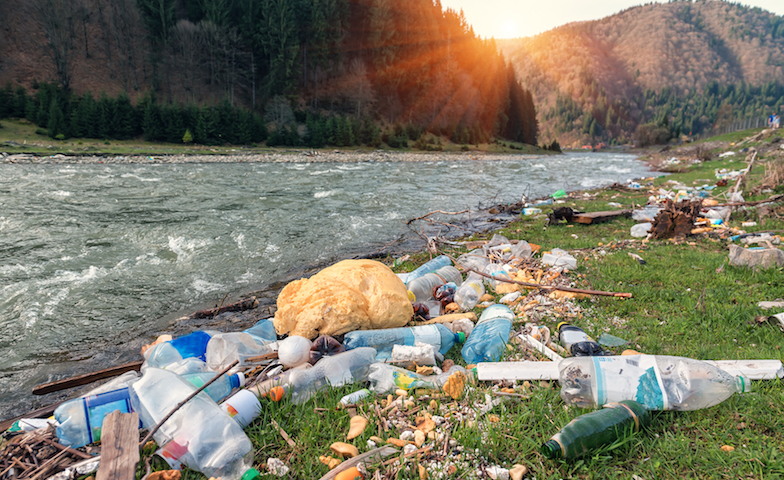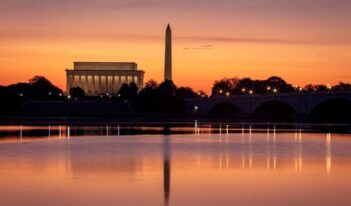
As the federal government and many state governments fail to address plastic waste, Indian tribes become policy innovators.
The world is waking up to the growing problem of plastic waste contaminating our ocean and terrestrial environments. Local governments—lauded as laboratories of innovation—have begun enacting bans and fees on single-use plastics, reducing the amount entering the waste stream in the first place. Businesses are stepping up; national and multinational governance bodies are adopting laws cutting down on the manufacture and distribution of single-use plastics. In the United States, California, the District of Columbia, Hawaii, and Maine have initiated statewide restrictions, while Oregon and Washington are considering similar measures.
Yet 12 states have moved in the opposite direction, prohibiting local governments from regulating single-use plastics. Many of these states already struggle to meet waste diversion and recycling goals. China’s recent clampdown on the importation of recycled plastic means a double whammy for localities already straitjacketed in their ability to reduce plastics entering the waste stream.
But these preemptive measures do not extend to the 573 federally recognized Indian tribes, which are sovereign entities subject only to the U.S. Congress’s plenary authority. As original inhabitants, traditional users, and stewards of the land, Indigenous peoples in the U.S. have long led the way in natural resource management and environmental protection. Unsurprisingly, several tribes are moving forward to reduce single-use plastics on tribal land.
Federal preemption of state law, and case law restricting state infringement on internal tribal affairs, limit states’ regulatory authority over Indian country—except under Public Law 83-280 of 1953, enacted during the Termination Era. That law granted to six “mandatory” states criminal and civil jurisdiction over Indian country. Originally, six “optional” states could take partial jurisdiction without tribal consent. But the U.S. Supreme Court later clarified that P.L. 280’s grant of civil jurisdiction was restricted to civil causes of action and did not extend to the “full panoply of civil regulatory powers,” which tribes retained. These regulatory powers encompass regulation of plastics.
Tribes’ civil and criminal jurisdiction over non-Indians is sharply circumscribed to a court-defined scope of inherent tribal authority. But the U.S. Supreme Court in Montana v. United States created two exceptions recognizing tribes’ civil jurisdiction over non-members. This includes when that non-member’s conduct threatens or has some direct effect on the political integrity, economic security, or the health and welfare of the tribe—meaning conduct imperiling the subsistence of the tribal community. Under this doctrine, and prior to its 2016 reinterpretation of the Clean Water Act’s “treatment as a state” (TAS) provision authorizing tribes to establish their own water quality standards, the U.S. Environmental Protection Agency confirmed that, due to the close connection between water quality and tribal health and wellbeing, tribes’ maintained inherent authority over their reservations—including over non-Indians on fee lands. Waste management arguably also falls within this framework. Further, courts have supported the right of tribes to tax non-members.
In states where local regulation of single-use plastics is prohibited, a small but growing number of tribes are exercising their sovereignty and adopting bans on single-use plastics.
Perhaps the most notable example is the Navajo Nation, which governs the largest reservation in the United States, comparable in size to West Virginia and home to nearly 200,000 people. Its Single-Use Bag Act, a 2015 bill that would have prohibited retailers from supplying plastic carry-out bags, was withdrawn from consideration in favor of vetting the issue through a robust public review process. Navajo Nation EPA (NNEPA) is currently developing both a new Single-Use Plastic Bag Ban and a youth-initiated Styrofoam Use Ban. NNEPA intends for this legislation to incorporate core fundamental concepts of Diné culture and philosophy pertaining to environmental stewardship.
In Florida, Seminole Gaming eliminated plastic straws and bags at its six casinos. The Pokagon Band of Potawatomi Indians in Michigan and Indiana is rolling out its green initiative, Skëbgyak Zhetthkén (“Do it green!”). The Band’s single-use plastic ban currently applies only to single-use straws, plastic cutlery, and Styrofoam within tribal departments or at tribal events, but the tribe anticipates expanding the ban to Band-owned casinos. Tribal elders of the Match-e-be-nash-she-wish Band of Pottawatomi Indians of Michigan successfully challenged the tribe’s casino to ban plastic straws.
In Minnesota, the Lower Sioux Indian Community is considering prohibiting single-use plastics, and the Leech Lake Band of Ojibwe bans Styrofoam. The Mille Lacs Band of Ojibwe is developing statutes to first ban single-use polystyrene products and then single-use plastics for sale and use at tribal facilities. High school students led that initiative against Styrofoam products.
Outside of the states where local regulation is preempted, Alaska stands out with multiple Native villages adopting bag bans, beginning with Louden in 1998 and extending to Koyuk, Tanana, Nightmute, and the Aleut Community of St. Paul Island. The Metlakatla Indian Community recently adopted a ban. This development is particularly remarkable because Alaska’s authority over tribes is more extensive due to the Alaska Native Claims Settlement Act of 1971, which leaves the Annette Island Reserve, home to the Metlakatla Indian Community, the only reservation in the state. Alaska Native villages lack territorial jurisdiction but retain jurisdiction over internal domestic affairs. Authority to enact plastic bag bans therefore hinges on jurisdiction over community members where the village is not chartered under state law.
These developments further cement U.S. tribes as innovators in environmental protection and natural resource management—from using Indigenous knowledge to inform climate change procedures to incorporating cultural values into water quality standards. It is both ironic and inspiring that Indigenous peoples and developing nations, among the first impacted by environmental stressors caused by the rest of the world, are at the forefront of pioneering solutions.
To compare how states preempt local regulation of single use plastics, please refer to this table.




